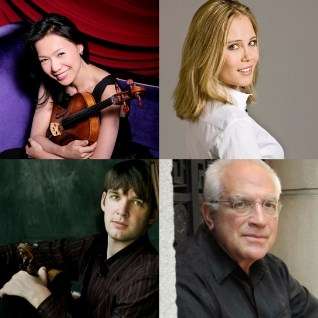|
Back
Transfigured...uh...45 Minutes New York
92nd Street Y at SubCulture
12/15/2014 -
Arnold Schoenberg: String Quartet No. 1 in D minor, Opus 7
Fred Sherry Quartet: Leila Josefowicz, Jesse Mills (Violins), Hsin-Yun Huang (Viola), Fred Sherry (Cello)

Huang H.-Y., L. Josefowicz, J. Mills, F. Sherry
(© Courtesy of the Artists)
Outside of the cute (and misguided) title–”Schoenberg Before Schoenberg”–hearing this single 45-minute single-movement work for the first time was a shock to the senses.
To get over the mundane first, Schoenberg, yes, is known as the 12-tone composer, the father of dodecaphony. Yet none of his most “popular” music is atonal at all. The expressionistic Transfigured Night preceded this First String Quartet, as did the even more iconoclastic Pierrot Lunaire and the romantic Gurrelieder and Pelleas and Melisande.
If, a decade after this 1905 work, Schoenberg broke the boundaries, he never scorned this earlier creation. In fact, he rather enjoyed the scandalous success, loved the idea that Mahler could make no sense of the score, and used the Quartet as an example of “heart and brain in music.”
So what do we make of it today? Or last night? Yesterday morning, I came upon the score, read through the first ten pages and gave up (this being my only resemblance to Gustav Mahler). Instead I made the wise choice of waiting for the performance at SubCulture last night.
Why, after all, should I plow through this forest of the densest counterpoint, where, venturing onto what seemed to be a straight highway, I would be tossed off into a foreign land of harmonies and notes unknown.
Secondly, why should I strain myself, when Fred Sherry–the legend of contemporary cello–had formed a string quartet with three other notable artists, including a youthful but equally iconic violinist, Leila Josefowicz. They would do the hauling and lifting, I needed only my ears.
Still, 45 minutes of Schoenberg in one go? Mr. Sherry, who has known virtually every composer of the last 40 years, did not know Schoenberg personally, but softened up the audience with a few tales. Yet the SubCulture audience didn’t need anecdotal emollients. We were all ready for the experience.
And yes, as the composer himself wrote, “the score looks more complicated to the eye than it sounds to the ear.” The opening at first seemed to go off in several directions. But the Fred Sherry Quartet brought everything under control. Schoenberg wasn’t afraid to bring forth a particularly schmaltzy Viennese waltz (shades of Mahler!). He could soothe us with a march and a folk song, and suddenly startle us with four-part harmony fro m a grade-school primer.
More often, we heard the harmonies of Transfigured Night. In that masterpiece, the music was literally piggybacking onto a literal story. In this String Quartet, it might have been possible to write a tale, but the composer let the music speak for itself.
Speaking in musical gestures which suddenly took off and came back again disguised, transformed, then disappearing in an amorphous mist. Whatever visions summoned up were Cubistic pictures, angled, partitioned, barely recognizable. Rare symmetrical phrases would crumple up, unwind, spring back again...
I confess that, in listening to the atonal Schoenberg, my mind tries to follow those rules laid out by the Master. In this case, the heart and ears far superseded the mind.
And in this case, all four players had learned the work with such painstaking care that the music had an honest spontaneity, as if they were bowing the form (whatever form musicologists would lay out) in conjunction with poetry and emotion.
This was a gorgeous performance of an unknown work, and I could only thank Mr. Sherry’s audacity not to tie it to any other music. With him in charge, one had no fear of its heavenly length. In fact, at the end, Schoenberg, offering up such sheer beauty, ended up with a pure absolute pianissimo D Major Chord, Ms. Josefowicz playing on the highest possible note.
The journey through Schoenberg’s dreams and fantasies came to rest not only in a familiar key, but with the notes of a child’s lullaby.
Harry Rolnick
|